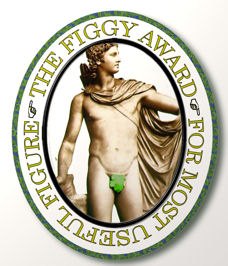Best Figure for Getting a Laugh
 Monday, October 29, 2007 at 01:21PM
Monday, October 29, 2007 at 01:21PM  Figaro is heading on a tour, but he has not shirked his figurative duties. For the next few entries, he’ll name the best figure for each of several useful purposes.
Figaro is heading on a tour, but he has not shirked his figurative duties. For the next few entries, he’ll name the best figure for each of several useful purposes.
Today’s winner for Figure Most Likely to Raise a Yuk is:
Paraprosdokian (pa-ra-proze-DOKE-ian), the surprise ending.
The paraprosdokian’s impossible-to-pronounce name makes it one of the most underrated figures. But the funniest people in history knew how to wield it. The figure starts with ordinary language or a cliché, and then smacks the audience upside the head with a different ending.
“She looked as if she had been poured into her clothes and forgot to say when.” (P.G. Wodehouse)
“It was a book to kill time for those who like it better dead.” (Rose Macaulay)
“To commit suicide in Buffalo would be redundant.” (Harold Arlen)
“I belong to no organized party. I am a Democrat.” (Will Rogers)
“One must have a heart of stone to read the death of little Nell without laughing.” (Oscar Wilde)
Though people avoid clichés like the plague, they’re a great resource — they make the rhetorical world go round — but only if you transform them with your instant wit. Give your next cliché a paraprosdokian twist, and the world will be your oyster. Whether you like oysters or not.
Runners-Up:
Tasis (TAY-sis)
The delectable figure.
Anthimeria (an-thih-MARE-ee-uh)
The verbing figure.


Reader Comments (6)
Garden of Eatin', on the other and, is a PARANOMASIA, the near-pun.
Fig.
Check it: www.deepthoughtsbyjackhandy.com
"When I found the skull in the woods, the first thing I did was call the police. But then I got curious about it. I picked it up, and started wondering who this person was, and why he had deer horns."
Fig.
Thanks,
lidoodledog